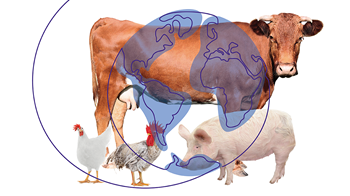<div style="width:85%;"><h5 style="text-align:center;"><em>This is the fourth installment in the FMI blog series on <a href="https://www.fmi.org/blog/sustainability">sustainability</a> in the food industry. This series will share compelling research and cover aspects ranging from consumer perspectives to industry opportunities.</em></h5></div><p>By: Rick Stein, Vice President, FMI </p><img src="https://www.fmi.org/images/default-source/blog-images/sustainability-animal-welfare.tmb-large-350-.png?Culture=en&sfvrsn=a05fe0c6_1" style="float:right;" class="-align-right" alt="Sustainability and Animal Welfare" sf-size="100" /><p>It would be convenient if the perspectives and behaviors of sustainability-focused shoppers were uniform. That would enable the food industry to easily understand these consumers. However, the reality is far more complex.</p><p>A case in point involves shoppers who buy meat and poultry. About a third consider animal welfare, the planet and social responsibility in their purchase decisions, according to FMI’s <em><a href="https://www.fmi.org/forms/store/ProductFormPublic/power-of-meat-2023">The Power of Meat 2023</a></em>, which is based on a national consumer survey. </p><p>Yet there are many nuances in how these shoppers’ considerations play out. The food industry needs to better understand these consumers so it can further enhance its engagement and practices. </p><h5>Evolving Perspectives on the Environment and Animal Welfare</h5><p>Between 2019 and 2023, there was a slight decline in the share of shoppers considering "better-for-me/my family" when buying meat/poultry, though this easily remained the primary driver. The largest multi-year increase was seen in animal welfare, with 37% of shoppers considering this factor, up nine percentage points compared to 2019. "Better for the planet" is on the radar of 35% of shoppers, up six points.</p><a href="https://www.fmi.org/forms/store/ProductFormPublic/power-of-meat-2023" class="-align-center" style="display:block;margin-left:auto;margin-right:auto;margin-bottom:10px;"><img src="https://www.fmi.org/images/default-source/blog-images/sustainability-blog-08-07-23-bar-chart-1.png?sfvrsn=627489e9_1" style="display:block;" alt="Considerations when selecting your purchase in the meat department" sf-size="100" /></a>
<h5>Confusion about Industry Practices </h5><p>About one-third of meat consumers are unsure about animal welfare practices in the U.S., including those related to the meat/poultry they buy at the store.</p><p>Said one consumer quoted in The Power of Meat:</p><ul><li style="list-style:none;"><strong><em>"I assume that my store sells meat from animals that were humanely treated, but I don’t really know. It would be nice to have more insight into that."</em></strong> </li></ul><div style="width:80%;margin:1.5em auto;background-color:#f7f7f7;padding:1.5em 2.0em;"><strong>Meat shoppers who emphasize animal welfare in their purchases are more likely to include the following in their definition:</strong><br /><ul><li>Access to the outdoors</li><li>Access to natural daylight</li><li>Maximum hours of transportation from farm to harvest</li><li>How long animals live</li><li>Access to antibiotics if sick</li></ul></div><h5>Views about Food Retailer Commitments </h5><p>About half of meat shoppers relay confidence that the meat they purchase comes from humanely treated animals or that grocery stores are committed to responsible and ethical sourcing. Forty six percent believe there is ample information provided by grocery stores, yet about a third say there is not. In fact, 58% say it would be useful to have some kind of animal welfare ratings or certifications for the meat they purchase. </p><a href="https://www.fmi.org/forms/store/ProductFormPublic/power-of-meat-2023" class="-align-center" style="display:block;margin-left:auto;margin-right:auto;margin-bottom:10px;"><img src="https://www.fmi.org/images/default-source/blog-images/sustainability-blog-08-07-23-bar-chart-2b.png?sfvrsn=b24d0d89_1" style="display:block;" alt="U.S. meat shoppers and animal welfare" sf-size="100" /></a>
<p>Approximately half of meat shoppers believe U.S. farmers have good animal welfare standards or are committed to responsible and ethical sourcing. About 40% of shoppers believe that meat and poultry brands are committed to sustainable production or social responsibility.</p><h5>The Protein Pact and Sustainable Development </h5><p>FMI is an endorser of <a href="https://theproteinpact.org/" target="_blank">The Protein PACT for the People, Animals and Climate of Tomorrow</a>. The pact is designed to accelerate momentum and verify progress toward global sustainable development goals across all animal protein sectors. In 2022, the <a href="https://meatinstitute.org/" target="_blank">North American Meat Institute</a> conducted its first ever data collection on 92 different metrics among its members. Companies representing more than 90 percent of the volume in the industry participated in the first year, establishing a solid baseline toward achieving ambitious industry goals including: </p><ul><li>Optimize contributions to healthy land, air and water.</li><li>Be the leading source of high-quality protein in balanced diets. </li><li>Provide the most humane care and raise healthy animals.</li><li>Produce safe products without exception. </li><li>Support a diverse workforce and ensure safe workplaces. </li></ul><h5>Industry Opportunities for Consumer Education </h5><p><em>The Power of Meat</em> says that shoppers who emphasize planet, people and animals tend to align their values with those of the store and the brands they purchase. </p><ul><li style="list-style:none;"><strong><em>"This provides an opportunity to actively communicate about sourcing standards and raising practices along with efforts in minimizing energy, water usage, waste, etc.," the report states.</em></strong> </li></ul><p>I very much agree with this perspective. There are openings to educate shoppers about industry practices. This is especially important at a time when many consumers express confusion and seek more information about industry efforts. I’m excited about opportunities to increase engagement with consumers on the topics of animal welfare, the planet and social responsibility.</p><p><a href="https://www.fmi.org/industry-topics/corporate-social-responsibility/sustainability" class="button">Sustainability Resources</a></p>
[#item_full_content]



